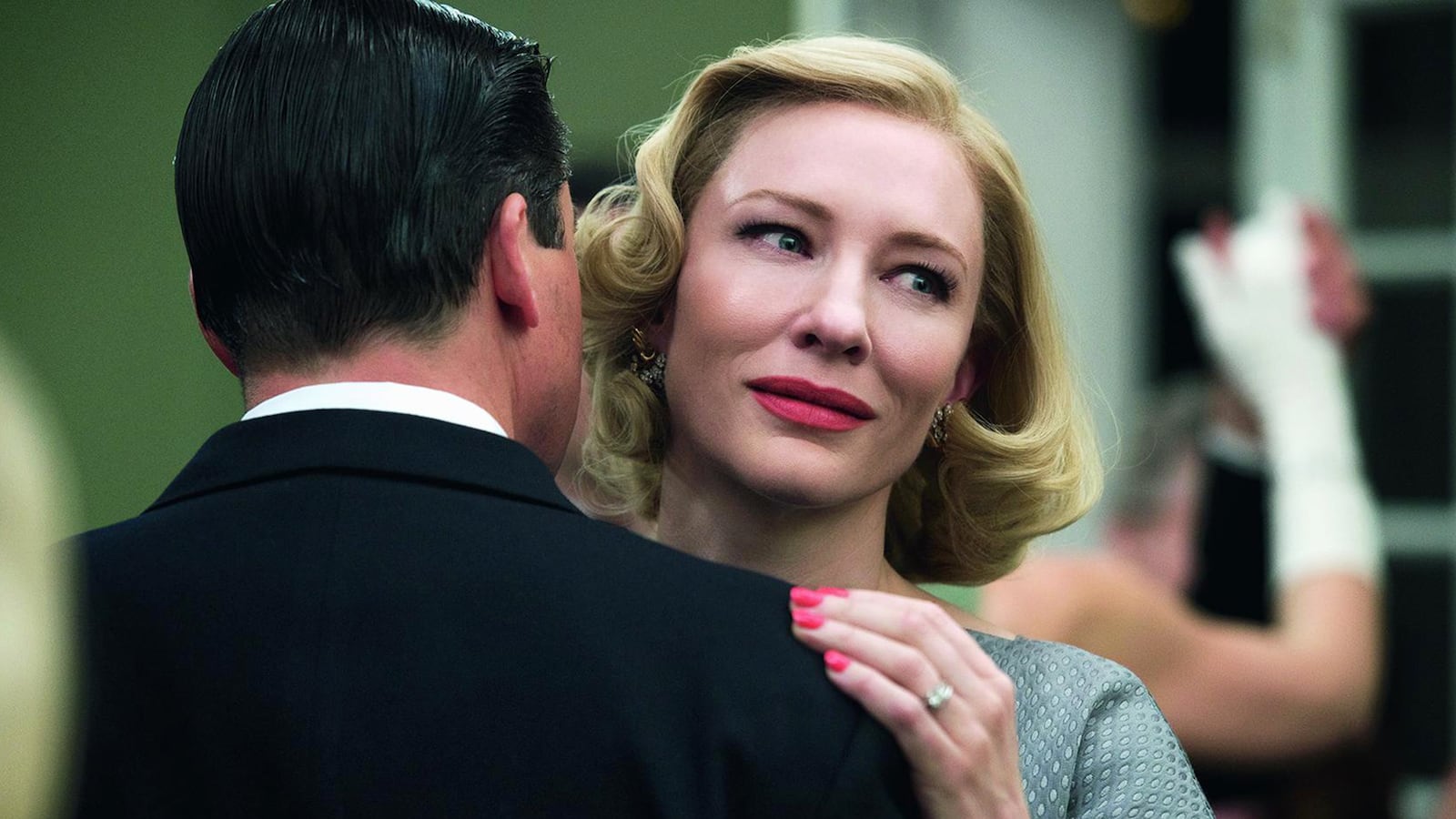The press conference for Todd Haynes’s Carol, a Cannes Competition entry that premiered on Sunday, certainly had its farcical moments. Although the phrasing was a little opaque, a journalist seemed to ask Cate Blanchett, the film’s star, if she could still feel “sophisticated and glamorous” after sullying herself by performing a lesbian sex scene in Haynes’s adaptation of the Patricia Highsmith novel, which was originally published under the pseudonym Claire Morgan as The Price of Salt. Blanchett herself, who appeared bemused by many of the questions, some of which were equally inane, corrected the record by asserting that a Variety interviewer mangled her admission of having had “many relationships” with women over the years by misconstruing these relationships as sexual encounters.
“From memory, the conversation ran: ‘Have you had relationships with women?’ And I said: ‘Yes, many times. Do you mean have I had sexual relationships with women? Then the answer is no,’” said a vigilant Blanchett at the presser, claiming that the second part of her quote about the relationships being non-sexual “obviously didn’t make it.”
This sort of confab is par for the course at Cannes, proof positive that many actors and filmmakers are more intelligent than frequently clueless journos. After all, Carol’s restrained love scene is considerably tamer than the raunchier fare broadcast weekly on HBO and Showtime. Viewers in search of softcore lesbian sex would be better advised to dust off their DVDs of The L Word. If anything serious was revealed during the proceedings, however, it probably pertains to the fact that, outside of the relatively “sophisticated and glamorous” confines of film festivals, the subject of lesbianism is still nearly as incendiary as the furtive love affair depicted in Carol, a film set in New York in 1953 as Dwight D. Eisenhower ascends to the presidency. Haynes and screenwriter Phyllis Nagy in fact make explicit the connections between the sexual repression of the early ’50s and the political repression that besieged the American left at a time when the House Un-American Activities Committee was looking for Communists under every bed—especially in Hollywood.
Like Haynes’s Far From Heaven and his multi-part HBO adaptation of James M. Cain’s Mildred Pierce, Carol is much more invested in reconstructing the historical roots of our contemporary attitudes towards sex and class—and reinventing melodrama—than in titillation. Haynes and his collaborators, particularly production designer Judy Becker and cinematographer Ed Lachman, reconstruct the gritty postwar facades of 1950s New York (the film was actually shot in Cincinnati) in order to explore the inner lives of characters more or less unable to grasp the mere concept of homosexuality. It’s unlikely that either Carol (Blanchett), the film’s unhappily unmarried middle-class housewife, or the object of her affection, Therese Belivet (Rooney Mara), would have defined themselves as lesbians during this era.
Carol is often identified as both the only Highsmith novel in which a character is not murdered and the only lesbian novel of its era with a happy ending. As in the novel, the movie’s heroines meet cute at a Bloomingdale’s-like department store called Frankenberg’s where Therese works as a clerk in the toy department. The exchange of glances between the tall, swanlike Carol and the petit Therese is rooted in a fleeting moment of unfulfilled desire, a tiny biographical incident that fueled the novel’s premise. According to Jeanette Winterson’s account, in a review of Joan Schenker’s excellent Highsmith biography, The Talented Miss Highsmith: “As a young woman in New York City, Pat was working in the toy department of Bloomingdale’s earning Christmas cash, when a wealthy Venus in furs, older, handsome, came in to order a doll. Simultaneously falling in love and falling ill with a fever, Highsmith went home in a daze and plotted the whole scenario for her novel—and even dared to give it something like a happy ending. What she didn’t dare to do was publish it under her own name.”
Given this departure point, Carol can be considered a wish-fulfillment fantasy retooled for a 21st-century audience. Haynes’s casting of Blanchett takes Highsmith’s veneration of an elusive upper-middle class glamour puss to a new dimension. A fearlessly theatrical actress, Blanchett’s manner, both haughty and self-lacerating, is frequently as over-the-top as Blanche DuBois’s in A Streetcar Named Desire—a role Blanchett played successfully on stage during an international tour. When Carol utters a rather banal sentiment such as “just when you think things couldn’t get any worse, you run out of cigarettes,” the observation embodies the world-weariness of a woman trapped in a claustrophobic heterosexual marriage. Her desire for freedom climaxes in a rather aimless road trip she takes with Therese to escape the clutches of her obsessively jealous husband Harge (Kyle Chandler), a conservative businessman. While Harge is not precisely a villain, just an utterly conventional man who cannot understand his wife’s yearnings, Haynes and Nagy are quite forthright about the character’s ties to the redbaiting ambiance of the ’50s. In an effort to deny Carol custody of her young daughter, Harge blackmails her by having a private investigator tape-record her pillow talk with Therese—J. Edgar Hoover-style—at a series of Midwest hotels.
For the real critics convened at Cannes, the debate surrounding Carol is not bound up with moralistic discussions of the film’s tasteful love scene. The leading trade papers lauded Carol for its meticulous craftsmanship, bravura acting, and fidelity to its source material. Conversely, it’s been deemed a “cold” movie that sinks under the weight of its art direction, and its largely unknowable protagonists, by a vocal minority, most of whom have yet to denounce the film in print or online. Cannes, of course, is frequently referred to as a “bubble” and the real verdict on Carol’s merits will come when The Weinstein Company releases the film stateside in December.
As for Blanchett’s real-life sexual predilections, well, the actress said it best: “In 2015, the point should be: who cares? What often happens these days is if you are homosexual you have to talk about it constantly, the only thing, before you work. We’re living in a deeply conservative time.”






